|
MORE: see our special features section for an in-depth analysis of A Momentary Lapse of Reason When The Bell First Rang by John Valenzuela
It was seven years ago that I had the pleasure of helping Pink Floyd launch The Division Bell, and I still have some pretty vivid memories of the time. However, since I am writing this article from memory, forgive me ahead of time if there are some specifics that I can't recall. In January of 1994, the infamous Pink Floyd blimp (The Division Belle) started showing up in the skies over North America, and for most of the world its origins and purpose were a mystery. For me and my work cohorts at The Album Network, however, there was no mystery: Pink Floyd had a new album and tour that were going to be unleashed on the world shortly, and the blimp was the first sign of the magnitude of things to come. The plan was for the blimp to land at the Rose Bowl in Pasadena, California, on the morning of February 2. We were going to be there, along with a large conglomerate of worldwide press agents for all reporting mediums including print, radio, and television. And so it was, early that morning, that I found myself with a local audio crew setting up the broadcast gear and awaiting the arrival of the now-infamous airship. My boss and the press conference host, Bob Coburn, speculated as to what Pink Floyd had in store for us this time. None of the new music had been heard, and really Pink Floyd hadn't been heard from at all since Knebworth 1990. Needless to say, I was pretty excited.
Just before the airship came into view, Steve O'Rourke's assistant gave me a CD copy of Delicate Sound Of Thunder, and told me, "The moment you spot the blimp, play "Yet Another Movie" loud over the PA system." "Not a bad choice," I thought. So, as soon as the blimp came into view, on it went. On that overcast February morning, as the blimp grew bigger and bigger into view, and the quiet of the Rose Bowl park was disrupted by the thunderous opening of "Yet Another Movie", and the blimp dropped down and eventually landed on the grass outside the stadium, it was quite a dramatic moment, and a fierce way to kick off the Year of the Bell. Steve O'Rourke addressed the crowd first, announcing the new album and tour, then he, Mark Fisher, and Michael Cole fielded questions from the audience. The question I specifically remember was when someone from the press pool asked, "Will there be all the usual Pink Floyd props on this tour, like the pig or a wall?" I looked at Bob Coburn and said, "That guy didn't just ask if they're gonna build a wall, did he?" Bob laughed. Steve, Mark, and Michael all looked at each other for a moment.
Then Mark Fisher spoke up. "We don't want to reveal any surprises." O'Rourke followed up with, "I can guarantee you that there won't be a wall." And so it was, the album was announced, the tour dates were given, the press kits were handed out, and the blimp took off as dramatically as it had landed and headed off over the hill. I never saw the blimp again after that, but the image and memory was permanently burned into place, and the excitement had begun. Pink Floyd was coming back. I guess the only disappointment for me that day was the fact that Floyd's L.A. date would be at the Rose Bowl. Sorry, Pasadena; the Bowl is fine for football games, but it's a lousy place for a concert. I agree with Roger Waters that stadiums in general are crappy places for a rock concert, but the Rose Bowl is exceptionally bad. The rows of seats are way too close together, parking sucks, access from the concourse to the stadium is minimal, the acoustics are lousy; I could go on. But the mere fact that Pink Floyd was hitting the road again was more than enough to compensate for any venue-related anxieties I had. The rest of February passed, and our broadcast calendar was really starting to fill up for March. It was looking to be our busiest month ever in the history of our then-young broadcast department. I think there was an event every weekend in March, and at the time the Album Network broadcast department was only two people strong. On top of all that, just when my boss and I were convinced that we were running at full capacity for March, the president of Album Network called us and said, "I know March is packed, but we need to make room for a Pink Floyd World Premiere broadcast, okay?" Trust me, regardless of workload, there's always room for Pink Floyd in my schedule. And it was that moment when I coined a phrase that I've used often around the office: "When Columbia Records says 'Pink Floyd', the world says 'how high?'" The plan was to record a "round table" style interview with David Gilmour, Nick Mason and Richard Wright (with host Redbeard moderating) in Palm Springs where the band was staying during rehearsals. Then, we'd chop up the interview, add the music (and those pesky commercials), and then broadcast the end results along with live coverage from opening night at Joe Robbie Stadium in Miami.
As you can imagine, I was okay with this plan. As the weeks went on and preparations were under way, I still hadn't heard any music. "Keep Talking" eventually made its way to the airwaves, but the rest of the album remained elusive. Then, the evening before we were to head to Palm Springs, my boss was hand-delivered a cassette of the album. Never had I seen such security around a single piece of chromium oxide tape. Prior to the delivery, our main contact at Columbia spoke with my boss and I and made it very clear that this tape was not to be copied, duplicated or even played for anyone other than us. Again, I was okay with that. The drive from Los Angeles to Palm Springs is about 100 miles and takes approximately 90 minutes, depending of course on traffic. It was Friday afternoon when my boss and I hit the road in my truck loaded with recording gear. He had kept the tape the night before and had listened to the whole thing, so I urged him not to say a word and just pop it in the tape deck. As the opening moments of "Cluster One" began to play, I thought something was f*cked up with my deck. "Oh sh*t," I thought, "brand new Floyd and my tape deck just ate the tape." As I reached for the deck, my boss assured me, "Don't worry, that's how it starts." "Cluster One" played on, and my first reaction was similar to my first reaction to "Signs Of Life" back in '87. "Okay, interesting, Floydy, pretty cool opening." Then "What Do You Want From Me" kicked in. Sold. Done. Convinced. "Already," I thought, "this blows the doors off Momentary Lapse Of Reason." Why? Simple. Rick Wright. That opening electric piano through the wah wah pedal is pure Floyd. I've always thought that Momentary Lapse sounded more like a David Gilmour solo album than a Pink Floyd album, much in the same way that I've always considered The Final Cut a Roger Waters solo album. The two albums are so strongly dominated by one person respectively, that the band feel is missing for me.
Such was not the case with this new one. Immediately, Rick Wright shines bright. The bass and drums gel like a real band. And when Dave kicks in with that opening guitar scream, man, the shivers up the spine attack. As the last strains of "What Do You Want" trail into the opening strains of "Poles Apart," all I could muster up to my boss was "wow." Then the opening line of "Poles Apart" — Did you know it was all going to go so wrong for you? "Sheesh, Dave, don't hold back now." It wasn't until later I would find out that line wasn't about Roger, but for the moment, it sure sounded like a full-frontal attack. As I continued to drive towards Palm Springs, continually being awed by the new music I was hearing, my excitement started kicking in. I was going to meet Pink Floyd face to face. Hell, I was going to work with Pink F*cking Floyd! All right, relax. You can't act like a rabid fan on the loose. Calm down. It's just another broadcast. It's just another band of musicians. It's just another — aw, who the hell am I kidding? It's Pink Floyd, the band that has been one of my musical gurus for most of my adult life. You have to understand that, with the job I have, yes I have opportunities many people would kill for, but I still have to maintain professionalism and get the job done. The fan in me has to go on hold, regardless of who the artist is. Most of the time this is manageable, but there are times when it's pretty damn hard to hold it all in. This was definitely going to be one of those times. "Take It Back" finished playing and I said to my boss, "There's a radio hit." Ugh. Did I really just call a Pink Floyd song a "radio hit"? Okay, there's the business in me raising its ugly head. "Sorry, Pinky ol' boy, won't happen again." The battle between the music fan and the music industry professional wages on. If I may say so, however, I was right. "Take It Back" did indeed become a hit at rock radio. "Lost For Words" played, and the obvious lines "I open my doors to my enemies/and ask could we wipe the slate clean/and they tell me to please go fuck myself" jumped out. "Okay," I said, "that one has to be about Roger." I do like that song, but not for the lyrics. Not that they're bad, but it's the acoustic guitar work that really grabbed me. Good stuff there. Then came "High Hopes." When that song ended, thus ending my first visit to The Division Bell (the "Charlie" phone call wasn't on the cassette) again all I could muster up was "wow." Palm Springs, Pink Floyd, dinner — man, I'm ready. Dinner that night wasn't with the band, but it was with Steve O'Rourke, my boss, our company's president, Redbeard, and our reps from Columbia Records. Basically, the evening's conversation was about Pink Floyd past and present, about Storm and Hipgnosis, about the new album, the artwork, and really anything else Pink. It was also determined at dinner that it would be better for Redbeard to interview them one-on-one rather than as a group, which looking back was a brilliant decision because it allowed for each band member to have his full say on matters. And I have no reason to doubt that, by the end of the night, it was clear to everyone that I was quite the Pink Floyd fan. We adjourned for the night, and just as I predicted, sleep was next to impossible. As I paced the floor of the conference room the following afternoon, waiting for the arrival of David Gilmour, I reflected back to 8th grade when I first heard Pink Floyd. Perhaps I was lost in thought or maybe lost in nerves, but out of nowhere entered David. "Wow," I thought, "he sure looks different than what I thought." I think it was the short, almost military style haircut that threw me. Nevertheless, it was David Gilmour being introduced to me, and his unmistakable voice confirmed it. "Hello, Johnny, nice to meet you." I sure hope I said something coherent, but I honestly don't remember what my first words to him were. The interview went ahead, and as it went along it became pretty clear that Dave had no intentions of divulging what any of the songs were about, leaving it up to the listener to decide. At a break in the interview, Dave came over to view the recording gear. Again, I hope I was able to be coherent as I explained our setup to Dave, but I honestly don't remember. And near the end of Dave's interview, I spotted Nick Mason through the conference room window, which meant he was next. Between Dave and Nick, the two exchanged some pleasantries, talked with my boss and me a bit, and then Nick sat down for his turn. I had my camera with me, but it was plainly clear that there would be no photos and no autographs. A bit of a bummer for the fan in me, but I was okay to leave with only memories (and, of course, the tapes). Nick was just as gracious as David, talking with me briefly after the interview. He was very proud of this new album, and he agreed with me on the "band sound" being back. He too attributed that to Rick Wright's involvement. And as if on cue, Rick Wright entered the room. Rick's interview was the shortest of the three, clocking in at just under 30 minutes, but it was not short for information. Rick was very happy to be back in the fold, and his enthusiasm was apparent. This was the first time I had ever heard Rick speak, and I was pleased to hear how eloquent a man Richard Wright is, raising the question, "I wonder why there's no Rick interview in Pompeii?" Of the three, I had the most post-interview time with Rick, and as a fellow keyboardist, we talked boards. We agreed on the irreplaceable sound of the Hammond B3, and that no technological advances could substitute for the vintage behemoth of the B3. But you know what? We probably could have been discussing horticulture and it wouldn't have mattered to me. I was talking to Rick Wright, possibly the single most important keyboard player in my musical world, and he was cool. This was cool. My job is cool. Damn, life right then was pretty cool. But the best was yet to come. As I started packing up the recording gear, Steve O'Rourke asked us if we wanted to come out to the Air Force base that evening to watch a rehearsal. Now, life is cool. "Yes" was the obvious answer, and that evening found us headed to Norton Air Force base nearby. It was pouring rain as we headed out there, but knowing that they were rehearsing in one of the large hangars, the rain wouldn't stop them. I will never forget the moment when we pulled up to the hangar. The rain was coming down hard, the doors of the hangar were open, and from the interior poured out lights, lasers, and the unmistakable dissonance of "Astronomy Domine." The big boss asked, "Any idea what song this is?" "'Astronomy Domine,' from the first album," I said in complete disbelief. I was one of those fans that was a little disappointed with the '87 set lists in that there wasn't anything prior to Meddle, but now I was being treated to a live performance of a song off Piper! Remain calm. Walk quickly. Remain calm. We entered the hangar just as they finished "Astronomy." There I was, looking at the massive stage in all its glory. No wonder they had to rehearse here, this thing is huge! For the next 90 minutes, I sat on a road case with my boss, his boss, his wife, Redbeard, Steve O'Rourke, and our two Columbia reps, and watched Pink Floyd rehearse. I have to pause just now as I remember that moment. Pink Floyd was playing a full-on show — quad sound, lights, films, and all — for the seven of us. At times, my companions got up, moved around a bit, went to the hospitality area, etc. but I remained transfixed where I was. And folks, they rehearsed "Wearing The Inside Out" that night. I know it's been the subject of debate as to why they never performed it live, but I can assure you that they at least rehearsed it that night. They ended the first set with "One Of These Days," but the pigs didn't make their appearance in the towers that night. No matter. We all went back to the hospitality area for dinner. I kid you not, Pink Floyd had lobster for the crew's catering, and this was no small crew. So there I was, having lobster dinner with Pink Floyd during a break in their rehearsal. I just had to write that line so I could read it myself. Even to this day I still can't believe it happened. I will say that we weren't seated at the same table as the main three, but nevertheless, they were within "could you pass me the pepper" distance. Too bad I didn't think to ask that at the time. We went back out to the road cases for the rest of the rehearsal. At one point, I said to the big boss, "You know, they're playing just about every song off Dark Side, why don't they just play the whole thing?"
Did Steve O'Rourke hear me say that? Did he possibly register my statement in his mind and bring it up to the band later that year? Was it my simple query that may have lead to Pink Floyd performing Dark Side of the Moon in its entirety late in the tour? Well, probably not, but please allow me this moment to think it was. And if I may say so, since they only played it twice in the states, most of the US is owed a Dark Side performance, thank you very much. (Just kidding guys; whatever you want to do is fine by me. But I'm so bummed I didn't see one of those shows!) After the rehearsal was over, we all went back to the hotel in Palm Springs. I think we may have had a nightcap at the hotel bar, but the band didn't join us. No, the hangar would turn out to be the last time I had direct contact with Dave, Nick, and Rick. But you know what? Looking back on that weekend, I couldn't have asked for anything more. It was a dream of a lifetime, and in the months to follow, I would be caught up in the Pink Floyd phenomenon once again, as all of us fans were. And as for the "fan/industry guy" battle that continues to wage on inside me, I will say that the fan is so glad the industry guy is there! John Valenzuela is a staff writer for Spare Bricks (and one fortunate sonofagun!)
A Battle of Words Haven't you heard...? In case you weren't listening closely enough, some of the frustrations of being in Pink Floyd surface in the lyrics. By Rick Karhu One of the inevitabilities of the kind of open and honest lyrical content that Pink Floyd has insisted upon almost from the start is that, quite often, those lyrics are mere reflections of the current state of mind or status of the band or band members. A quick glance at the lyrics of Pink Floyd over the last three decades reveals many moments of introspection, moments where the lyrics pull back from the rest of the world and become a mirror held up to the band members themselves.
Who can forget those harrowing moments where Syd Barrett makes an appraisal of his current state ("And I'm wondering who could be writing this song")? Waters mocked the band (reportedly) on the unreleased piece "Bitter Love" in which he chastised himself and the band for flirting with "selling out." What about those early nods to Syd in Roger's lyrics to Dark Side of the Moon ("And if the band you're in starts playing different tunes") or the pointed lyrics scattered throughout Wish You Were Here concerning the fractured state of the band ("It could be made into a monster/if we all pull together as a team")? The lyrics of Pink Floyd have covered lots of issues, but they do tend to come back to this personal sphere as if it were somehow the gravitational center of the Floyd universe. It shouldn't be a surprise then that, of all the Floyd lyrics, the most telling and personal come after the departure of Roger Waters in the mid-80s and the messy legal battles over the Pink Floyd name. Even the most jaded of rock-and-roll fans would recognize that the breaking up of an artistic unit can have severe and long-lasting effects. It wouldn't have been any different with Pink Floyd. There was simply a lot to say at that point about the state of the band members and some of it appears to have crept into the lyrics, even as early as The Wall.
It is generally acknowledged that Pink Floyd as an artistic unit started to crumble after Dark Side of the Moon, but it wasn't until the recording of The Wall that personality conflicts and long-standing frustrations finally came to the surface in ways that would forever change the group. It was during the recording of The Wall that saw the first casualty of this caustic atmosphere when Rick Wright was pushed out of the band. Accounts vary, but it is safe to state that this was largely done at the insistence of Waters who felt Wright wasn't contributing anything of value to the project. Wright himself states that he wasn't unhappy with the decision as he felt Waters was needlessly difficult to work with. Waters has stated that the "person" sung about in "Nobody Home" is an amalgamation of people he knew at the time. It has never been confirmed, although it's a good bet that "Nobody Home" was a late addition to The Wall as it contains lines that appear to refer to Wright in a rather unbecoming light: I've
got nicotine stains on my fingers Waters' lyrics wouldn't return to the tensions with his bandmates until the 1986 soundtrack of When The Wind Blows. There, during a song about religious leaders claiming rights to chunks of desert ("this land is my land") Waters injects a personal moment that could be construed as a commentary on the status of Pink Floyd: "This band is my band." It wouldn't be long before Gilmour would be telling him to "get your filthy hands off my desert."
Gilmour's own lyrics on his 1984 solo release About Face show that he, like Waters, wouldn't shy away from these kinds of personal commentaries. "You Know I'm Right" is an example as well as "Near the End." Either of these songs can be taken in other ways, but it's strikingly easy to see how the lyrics could fit the current situation between Gilmour and Waters. They read like fitting epitaphs for the deterioration of Pink Floyd. (And given Gilmour's frustrations with Pink Floyd, his decision to include "There's No Way Out of Here" on his previous solo album might have had some significance to it as well.) Reportedly, Gilmour had planned to include a piece about Waters on 1988's A Momentary Lapse of Reason. Although the track has never surfaced, the working title was "Peace Be With You." Gilmour would return to the theme of ex-bandmates on 1994's The Division Bell. Specifically, the song "Poles Apart" which contains lyrics that are hard to interpret in any other way. The most interesting (and possibly symbolic) phrase in the song is "The rain fell slow/Down on all the roofs of uncertainty." Rain being an obvious symbol for "waters," leads to some curious interpretations of this song. During the song "Lost For Words" Gilmour sings lyrics that sound both frustrated and resigned at the same time: So
I open my door to my enemies Although it could have easily been about anyone, it's tempting to see it as a commentary about Waters himself. (It was rumored on many occasions that Gilmour attempted to make amends with an unreceptive Waters although this fact has never been confirmed.) One of the most fascinating messages on the album is in fact done without lyrics at all. In Gilmour's own inimitable style, the message is sent with the music. "Cluster One", the instrumental piece that opens the album, features guitar, keyboards and drums. No bass. What God wants Although there is little on Waters' The Pros and Cons of Hitch Hiking or its follow-up Radio K.A.O.S. that appears to be any hint of Waters' feelings about his ex-bandmates, he more than makes up for it on Amused To Death. There is one surprisingly remorseful sounding line during "Three Wishes"—"I wish somebody would help me to write this song." Again, there could be a multitude of interpretations about this line, but it could certainly be that Waters is expressing some sense of sorrow that things turned out the way they did, depriving him of a valuable musical collaborator. During the song "Amused To Death" which closes the album there is a line which can be taken as a reference to David Gilmour and Nick Mason. "We drove our racing cars/We ate our last few jars of caviar." Given that the song is, on one level, about the destruction of the human race due to our indifference to the plight of others and a preference for our entertainments and distractions, this is a less than flattering image. (For you Floyd fans not up on your trivia, Gilmour and Mason are both race car enthusiasts and can be seen enjoying their pastime in the video La Carrera Panamericana, which also features some otherwise unreleased Floyd music.) "Everyone has his price Bob/And yours was pretty low." Those lines surface in "It's A Miracle" and Waters has stated that it is a direct reference to Bob Ezrin who produced The Wall. The line was in reference to Ezrin's preference to work with the newly rejuvenated Pink Floyd rather than with Waters. Waters explains in a 1992 interview with Compact Disc Magazine: "That line originally read 'Each man has his price my friends...' so make of that what you will. As a joke I sang 'Bob' instead and Pat [Leonard, producer of Amused To Death] insisted that we left it in. So although it was unintentional I'm happy that it's there for Bob Ezrin. I hope he appreciates it." Even if Ezrin doesn't appreciate the harsh honesty, the fans certainly do.
Rick Karhu is editor of Spare Bricks |

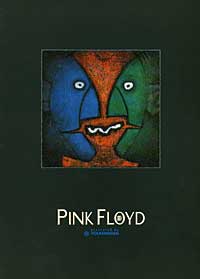
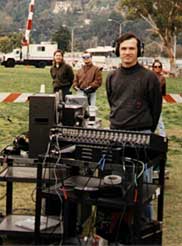
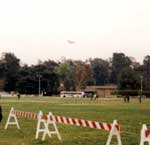
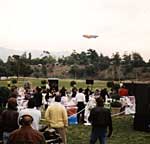
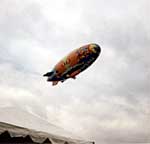
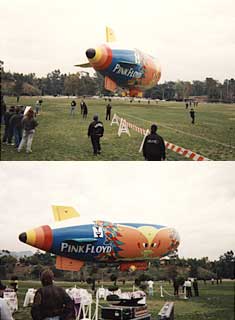
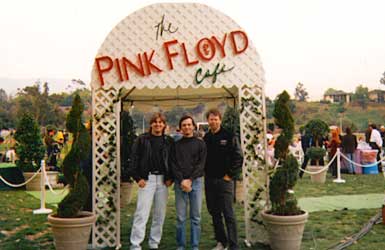
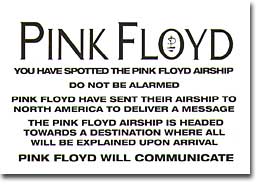 He
chuckled and said, "Yeah, no kidding."
He
chuckled and said, "Yeah, no kidding." 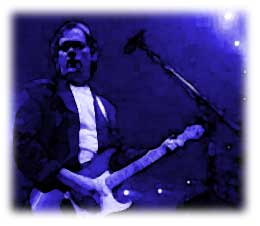 Get
your filthy hands....
Get
your filthy hands....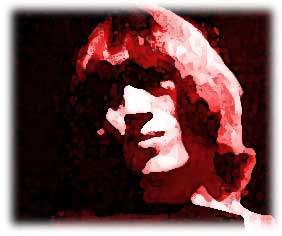 Could
we wipe the slate clean
Could
we wipe the slate clean